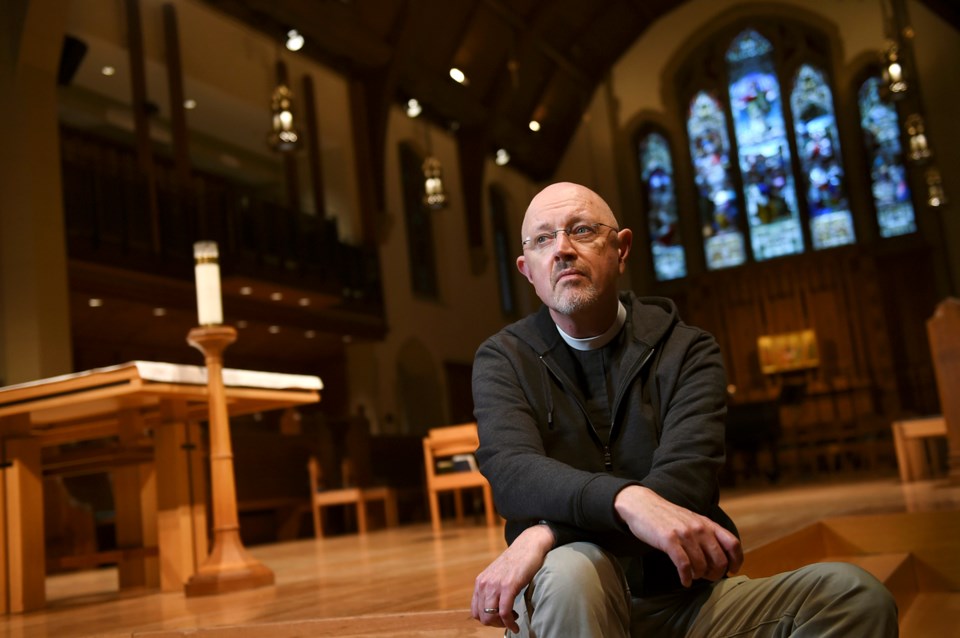The Anglican Church slapped down its American branch last month, punishing it for authorizing same-sex marriages.
The church has been riven for decades over issues of female ordination, the ordination of gay clergy and, now, same-sex marriage. The issue is so incendiary that it threatened to tear the global church apart. Archbishop of Canterbury Justin Welby, the head of the church, is credited with preventing a complete implosion.
Yet even in the seeming backlash to gay marriage, one of Canada’s top Anglicans says he sees signs of progress.
Rev. Peter Elliott, the dean of Christ Church Cathedral in downtown Vancouver and the Number 2 Anglican in the region after the bishop, has been at the heart of this debate for years and the local diocese — for historical reasons called New Westminster — is (in)famous for its progressive stand on the topic. The diocese offers a blessing for same-sex marriages, but solemnization of marriages is a national decision and the Canadian church is expected to vote this year on the topic, potentially opening a new front in the long battle.
The crux is this: The worldwide Anglican Communion is like the Commonwealth of Nations, Elliott says, united by history and values, but each member largely independent.
“There is not one structure for the whole Church,” he says. “It’s untidy.”
There is an agreement that individual churches can follow their own path, but not veer too far from official doctrine.
“Those of us who are pro-GLBT rights in the church — and I’m one of them, I’m openly gay and married to my partner — our view is that this is a matter over which Christians can respectfully disagree,” says Elliott. Other church leaders, especially some in Africa and Asia, where most of the world’s Anglicans now reside, say no … this is a fundamental issue of theology and a single approach must prevail. Elliott cautions, though, that while some African and Asian churches may be strongly against same-sex marriage, there are also strains within the “Western” churches — in Canada, the U.S., Australia and Europe — that feel likewise. It is not strictly a Western versus Developing World divide.
In the meeting of the 38 Anglican-aligned national churches worldwide at Canterbury Cathedral last month, the confab condemned the Episcopal Church — as it is called in the States — but also made explicit statements about respecting the rights of homosexuals worldwide.
“What we got actually was a classic Anglican compromise. Anglicans are good at that,” says Elliott. “There [are] very strong statements about the civil rights of homosexual people and I think there is a door opened now to say to, for example, Anglicans in Uganda: Listen, church support of government policies that criminalize homosexuality and make it punishable both by imprisonment and in some cases the death penalty, that’s offside. Similarly, to the Episcopal Church, marrying same-sex couples, that’s offside.”
Canadians need to understand, he says, that priorities for people in other places are very different and progress on gay rights has come with incredible speed to parts of the Western world.
“I never imagined in my lifetime that gay people would be allowed to marry in Canada and it’s now been over 10 years that we’ve been allowed to marry, nor that the church would be seriously talking about this,” he says. “It’s light years ahead.”
In Canada, we’ve drawn a line in the sand over equal marriage as the measure of a progressive position toward LGBTQ people. In parts of Africa, public opinion and, in some cases, law are still positing that gay people should be killed. In this context, what looks like a slap down to an American church also comes with what is a pretty stark message to some of the most homophobic forces in the world.
Above all, what was once called the love that dare not speak its name is being talked about endlessly. At a conference of Anglicans from around the world that Elliott attended, the universality of the discussion impressed him.
“It’s clear, particularly from the laity and from the priests from around the world, without exception, that every church in the Communion is in some ways dealing with the presence and reality of GLBT lives,” he says. “We’re just at very different stages on it, depending on what country are from.”
@Pat604Johnson



